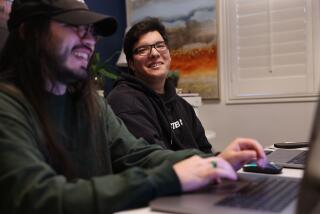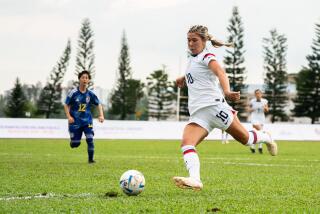Wills and Ways : Communication is no problem for Conejo Recreation and Park District therapeutic specialist, who was deaf since birth.
Vivid images amid mostly silence form Karen Wills’ world. Deaf since birth, the 28-year-old Thousand Oaks woman thrives in a field that demands sharp communication skills.
Vivid images amid mostly silence also formed a slide presentation that highlighted a May 27 dinner celebrating the Conejo Recreation and Park District’s 1990-91 therapeutic recreation activities for handicapped children.
The slides, accompanied only by the soft, uplifting strains of songs such as James Taylor’s “You’ve Got a Friend,” spoke volumes about Wills’ contributions as the district’s therapeutic recreation specialist.
Click
A young boy in the adaptive bowling class rolls a ball down a metal chute from his wheelchair to the lane below. Wills kneels beside him, offering quiet encouragement.
Click
Beaming track and field participants accept ribbons at the recent Ventura County Special Olympics. Wills, coach of the district’s team, wears the look of a proud parent.
Click
A player on the basketball team, his neck craned upward, intently watches a shot drop through the net. Wills is an assistant coach on the team, which recently qualified for the State Special Olympics at UCLA, June 21-23.
Click
Youngsters with learning disabilities are skiing at Big Bear. Wills has spent weeks instructing the youngsters on a simulated hill made of straw. Now, bundled in a parka, she waits at the bottom of the mountain with a smile.
The presentation concludes and the audience of handicapped children breaks the silence with some uninhibited whoops punctuated by loud table-pounding. As far as the kids are concerned, where there’s Wills, there’s a way.
“Because Karen has a handicap herself, she is better able to relate to these kids,” said Donna Heck, whose 10-year-old son Robbie has cerebral palsy. “She understands that each one is special. And each one of them feels special around Karen.”
Therapeutic recreation programs didn’t exist in Bellevue, Wash., where Wills spent her childhood. Forced into mainstream activities with non-handicapped children, she became an expert at reading lips and gradually learned to talk.
“To me, I’m normal. I just want to be like anyone else,” Wills said in a voice that is clipped and thick, though understandable. “I let handicapped people know they are capable of doing it. They can be part of the working world. Go for it.”
Wills began working at the district four years ago after graduating from Cal State Northridge with a degree in therapeutic education. She gets high marks from her supervisor, Cecilia McMullen, who was hired in July as therapeutic recreation coordinator.
“I had never worked with anyone hearing-disabled, so I didn’t have any preformed opinions about how I should act around her,” McMullen said. “She got used to my speech pattern very quickly. I’ve never had to modify my speech for her.”
Communication is even less a problem between Wills and the handicapped children. To them, Wills is anything but deaf, an often pejorative term used to describe someone inattentive or indifferent.
“Her rapport with kids is fantastic. They have a lot of trust in her,” McMullen said. “They know she is consistently kind.
“She is always praising them, telling the ones who do well how great they did instead of pointing out the children who are not doing something correctly. That motivates other children to do positive things.”
In Wills’ day-to-day work, her hearing impairment is rarely noticed, according to Pat Fernandez, whose son David has been involved in therapeutic recreation activities for several years.
“Karen’s handicap is nonexistent as far as (David) is concerned,” said Fernandez, who serves on the district advisory council for therapeutic recreation. “In meetings, I have to listen a little more carefully to her. But I’m not certain David knows that he has to do that for Karen.”
For Wills, words are often merely a means of measuring sensibilities. “After an activity, she asks me, ‘Did David enjoy that?’ ” Pat Fernandez said. “She wants to know how the kids are feeling.”
And when the handicapped children feel good, Wills has done her job.
“They are like my brothers and sisters,” she said. “I learn a lot from them.
“I’m lucky I’m able to talk pretty well. Otherwise, I’d have to be working in something that didn’t involve communication, like computers or something. I just want to work with the disabled population.”
UP CLOSE KAREN WILLS
Profession: Therapeutic Recreation Specialist for the Conejo Recreation and Park District
On her own disability: “People are very understanding.”
On the disabilities of the kids with whom she works: “Hopefully, some of these kids can mainstream into regular recreation programs. That’s a great idea.”
Personal goals: “I try to make everybody happy. That’s my job.”



